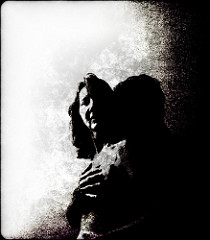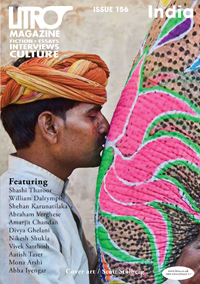You have no items in your cart. Want to get some nice things?
Go shopping It was her. She was prettier in real life: svelte, slim-wristed, utterly feminine, utterly cosmopolitan Indian upper middle class. She was striding towards the Rare Books & Music Room in a tight-fitting purple top and blue jeans, her heeled boots looking more expensive than anything I had ever owned. She turned, momentarily, as if remembering something and I caught sight of her expression. It was as if she disapproved, as if she didn’t have any time for my nonsense. ‘Who was she?’ I asked myself. ‘What was her name again?’
It was her. She was prettier in real life: svelte, slim-wristed, utterly feminine, utterly cosmopolitan Indian upper middle class. She was striding towards the Rare Books & Music Room in a tight-fitting purple top and blue jeans, her heeled boots looking more expensive than anything I had ever owned. She turned, momentarily, as if remembering something and I caught sight of her expression. It was as if she disapproved, as if she didn’t have any time for my nonsense. ‘Who was she?’ I asked myself. ‘What was her name again?’
I was seated at one of those big black tables on the first floor of the British Library, stuck between YouTubers and reluctant essayists, the majority of whom seemed keener on managing their Facebook accounts than finishing their work. I’d forgotten my Readers’ Pass and was cursing myself for having looked up because Wiggy Kenton (my eccentric boss at Oxford University Press) had me on a tight deadline for a big editing job: a German academic with bad English, writing on Shakespeare and the ‘Glocal’. Now I couldn’t stop staring at the Rare Books & Music Room, willing its walls to melt so that I might see Santosh Mukherjee’s wife again. I imagined her disdain when she caught me staring, my desire willing the entire building to de-materialise so that was just she and I. She was the unseen parts of Santosh, the world he’d stashed away. Intelligent, elegant, accomplished: Santosh Mukherjee’s beautiful wife. Who was she? What was her name again?
During those first weeks of my English Studies PhD, Professor Santosh Mukherjee had chased me so hard that I thought it was love. A fellow student had caught him looking at me in the lecture theatre and told me. That’s when I found myself dressing up for him, perfuming my hair, reading up. He was bright and attractive for his age, a welcome distraction from my true love, Sven, a Norwegian pilot who had left me for a Finnish girl. Once, when I spoke out at one his lectures, he described my question as ‘incandescent’. In our one-to-one tutorial, Santosh enthused about Derek Walcott’s poems before sidling up to me and saying, ‘You look so serious, Zainab. Where’s that lovely smile of yours?’ and later, ‘No need to leave. Relax a bit. Why so formal?’ We soon got to the sex and lies. At first he told me he and his wife were in an ‘open relationship.’ Then he said he was torn between his obligation to wife and his desire for me. And then he told me the truth.
‘I feel like I can tell you anything, Zainab,’ he said, one afternoon in bed. ‘I love my wife. She is the mother of my child and she reads everything I write. I’d be nothing without her. But we’ve been together for fifteen years. Fifteen years … it’s a long time to be with someone. I get bored,’ he continued. ‘I get curious. Is there anything wrong with being curious?’
His voice cracked.
I shook my head in agreement but deep down I was unsure. ‘How would I know?’ I thought to myself. I was twenty-two with only a BA and an MA to my name. I wasn’t as brilliant or as philosophical as Santosh Mukherjee. That night Santosh took off for a faculty leaving party with the suggestion that I should stay the night. In the darkness, I unearthed his suitcase from beneath our temporary bed. I half-expected to find souvenirs of the other girls. Instead I found a photo of Santosh’s beautiful wife. She was holding their baby daughter in her gold-bangled arms, proof that his other life really did exist. Moonlight shone on her face as I held it. Later, when I confessed I’d seen the photo, Santosh wearily told me that his wife researched the daily lives of a hunter-gatherer community on the Andaman Islands. I listened, my heart panicked. We didn’t speak of her again.
All through that overcast, wet winter in Kent we had sex/made love and continued our discussions on modernist poetry, on Hughes, Walcott, Larkin, and my very own thesis topic: the short stories of Jean Rhys. Santosh suggested I should change the topic from a consideration of Rhys’ short stories to those of Manto, tales he argued were closer to my Indian heritage. They were ‘vivid, intense, rich, and far more fun.’ Manto was a fine stylist and seemed to know something of the truth of life but sometimes, when Santosh talked about the writer’s characters I felt a creeping sensation along the nape of my neck. And right after sex, I’d tear apart his analysis in my mind, worrying whether or not Santosh really loved me. In those moments I’d watch his every move, searching for what was real. But truth evaded me and instead I’d feel a crackling, weakened sensation in my legs.
It was Santosh who ended it. He had applied for and won a full professorship at the University of Cornell. ‘I find you very attractive, Zainab,’ he had said, watching me dress, ‘but I have a wife … and a child. You understand.’ I nodded and looked away. Attractive. I had wanted to hear him say ‘beautiful’.
We spent our last weekend at an academic conference. We stayed in a gaudy hotel and drank Manhattan cocktails along the Thames.
‘You won’t tell anyone,’ he told me. ‘You’re good at keeping secrets.’
I shot back at him, accusing.
‘Only silly girls ruin big careers.’
His face darkened and he turned away. There was metal in his goodbye kiss.
I told my mother that academia just wasn’t for me. She had been right all along: it was impractical, poorly paid. And that very day, I met Wiggy Kenton in a department store elevator that got stuck for half an hour between floors. We chatted as we waited for help during which time he said he’d fix myself up with a junior editor role at OUP. It didn’t pay well but I thought, ‘Why not? What have I got to lose?’
Over the years, Wiggy would continue to insist that he couldn’t give me a pay rise. Sometimes during my coffee break, I would chance upon one of Santosh’s essays. (Wiggy was a snob and subscribed to literary magazines he never read.) The words of his arguments shone as bright as ever, incandescent. He seemed to be doing so well.
*
Her name was Meenakshi Mukherjee. I remembered it late that night in my Leytonstone bedsit, with its broken night lamp and sunken mattress. I was trying to finish Wiggy’s damn manuscript when all of a sudden, Santosh’s wife’s name lit up in my mind’s eye. Santosh had named her only once during our affair and I’d pretended not to notice the slip up. Secretly, however, I stolen it, stashed it inside me. Meenakshi Mukherjee. Of course.
I Googled her. She was a Cornel historian, dazzling just like him but with an even longer list of publications to her name. Santosh hadn’t lied about one thing. Professor Meenakshi’s research really did focus on the Jarawa people of the Andaman forests. Settled villagers lived outside the forest and her work demonstrated that exchanges between tribal and non-tribal groups were complex, political and under-studied. ‘The Andaman Islands … wasn’t that the place with the big a tsunami?’ I thought, gazing in admiration at the shining purple and gold sari on Meenakshi’s Wikipedia profile. I was amazed at how invisible and mawkish Santosh looked standing beside her.
The Andaman Islands were tropical, stunning and serene: a glittery honeymooner’s paradise. I imagined Meenakshi wandering through the islands, flanked by researchers and local guides, exploring with big maps, important questions pencilled into her notebook. She’d be sweaty in her white flowing salwar khamiz, drinking coconut water in the shade and talking politics.
Sometimes she’d stop to worry about the daughter she’d left with her grandparents in India. Maybe she’d worry about Santosh too? Her poor husband was all alone in Kent while she worked on the paradise island Maybe not, I considered with a smile. Maybe Meenakshi got bored too.
The following morning, I still couldn’t stop thinking about Meenakshi Mukherjee. Santosh’s wife was the stronger academic, and her list of publications far eclipsed Santosh’s own. I wondered if that burned my professor, my sometime man, and then I got myself wondering what she’d actually written. I pulled my first ever sickie at OUP and headed straight back to the British Library. It was morning rush hour on the central line and I imagined stepping onto the platform and crashing right into Meenakshi Mukherjee. ‘I’m so sorry,’ I’d tell her. ‘I didn’t mean to. I didn’t see you there.’ And then I’d touch her arm. ‘How are you? Are you okay?’
But a second encounter never materialised. Instead, I made my way into the Humanities 1 Reading Room of the British Library and ordered her latest book on the Andaman Islands, scrolling through Internet articles as I waited.
I read about Captain John Ritchie’s 1770 Marine Survey for the English East India Company. When he had arrived by night boat on the Andaman shores, he wrote that he had seen quivering beams of light lining the shore. Long after he had settled on the island, the captain still couldn’t decide whether the lights he had seen were man-made fires by local or the fireflies that swarmed the island shores at night. I imagined Meenakshi’s plane landing on the island’s airstrip then, her heart questing for the fireflies. But what if she arrived on a night boat, I wondered? Then entire coast would be lit up like Diwali for her, thousands of fireflies illuminating her pale skin. What a sight that would be! What a welcome!
Meenakshi had written about the islands’ foreign settlers too, of kidnappings and confinements, diseases that had been spread by new inhabitants, stillbirths and syphilis. It was an age-old story, of abuse and colonialism, of laying claim to that which could never be yours. She reported that the Jawara people saw the forest as vessel for darkness and light. According to the community’s elders, the forest’s luminosity was due to the presence of fireflies and stars, which helped keep balance and order in and above its canopy. I imagined Meenakshi and her researchers sitting in a story circle then, listening to the elders, their mouths dropping like children’s in wonder.
One Jarawa myth told that the world above the forest was home to a married couple: the moon and the sun. At night they wished to make love but were prevented from doing so by blinking stars, with their mischief and laughter. The couple remained close but they were rarely able to consummate their relationship. The stars had their role to play though, and it was thanks to them that the forest was rarely ever in complete brightness or darkness. The stars, according to Meenakshi’s ethnography, were similar to the forest fireflies: it was they who kept the order of light in the forest.
Meenakshi wrote that the Jawara people feared both intense heat and intense light. I understood somehow. I knew full well how bright lights could both attract and scorch you until you felt blinded, devoid of light. And that’s when darkness would creep up behind you, cast its black hood over you and carry you off in its sack for years. One of the elders said that newly married Jarawa couples would receive a log of smouldering wood to keep fireflies away. I thought about Santosh and Meenakshi and me. I imagined myself as a forest firefly, a nuisance to the couple’s harmony. But weren’t fireflies like the stars about the forest: as central to its complex system as the sun and the moon, sustaining the forest’s life too? Weren’t they as much a part of my constellation as I was of theirs?
Another myth told the story of how the Jarawa ancestors managed to retain the glow of fireflies in their bodies. I imagined joining Professor Meenakshi and her researchers as a PhD student in the forest then. We were gathered in a circle around the storytellers, our Dictaphones and listening. It was dusk in the forest, and other members of the tribe were listening too, watching us foreigners learning their stories, own mouths open in awe. What a tale that was! I’d tell Meenakshi and she’d agree, extrapolating its various meanings, wondering how best to write it up. Later, we’d fly back to the University of Cornel, my brilliant Professor and I. Meenakshi would invite me to a big party at her house, all rum and leftist South Asian politics, and that’s when I’d recoil, making some terrible excuse. I’d fly back to my apartment and seal myself within its dark walls, imagining Santosh, Meenakshi, and their talented daughter laughing and joking in their big sunlit house.
Late that night in my Leytonstone bedsit, my thoughts returned once more to the fireflies in the Jarawa forest. I wondered if the myths the Jarawa people told themselves were as real as real to them as mine were to me. They were small but far from insignificant: like the stars in the night sky, they too were keepers of light in the forest.
Unable to sleep, I replied to Wiggy’s irritable email. This time, I pushed back on his deadline request and demanded a pay rise. Then I texted my landlord about the broken lamp. I reminded him of his contractual obligations, telling him that I was looking to move out. There were no stars outside the window of my dark bedsit and the London sky was blanketed in familiar grey smog. I drifted into a heavy sleep, dreaming once more of arriving by night boat onto the islands’ shores. The stars above the forest had sent their emissaries, the fireflies, to greet me. They led me into the forest and it was as if the whole place was breathing, its pathways neither too bright nor too dark, lit up just for me.
*This story was informed by Vishvajit Pandya’s ‘In pursuit of fireflies: the poetics and politics of ‘lightscapes’ in the Jarawa forests’ in New Histories of the Andaman Islands: landscape, place and identity in the Bay of Bengal, 1790-2002.

About Divya Ghelani
Writer Divya Ghelani, who published her work in the Times and the Bookseller, is curently adapting her historical story, The Imperial Typewriter, into a short film. She is currently working on her debut novel, RUNAWAY.




